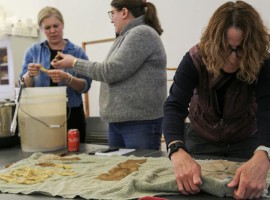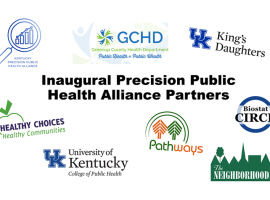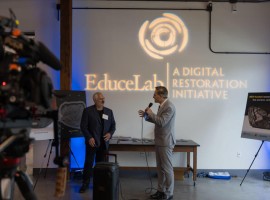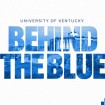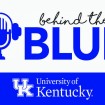'Behind the Blue': Everything is Science Takes Discovery to New Locations
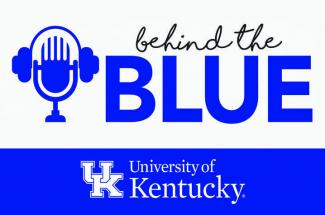
Science colors everything we do. From the moment we wake up in the morning until we go to bed at night, science is all around us. Science will get the recognition it deserves during Everything is Science — the weeklong festival featuring experts from Lexington and beyond, who will give presentations, demonstrations and conversation in laid-back spaces.
Everything is Science: Life in Technicolor will focus on colors — with events like, “We Heard it Through the Grapevine: Purple and Green in Science” and “It’s a Gray Area: Black & White in Science.” The experts will focus on the science of sleep, climate change and homelessness, color theory and linguistics.
Local restaurants and bars participating in the weeklong festival will host guests Monday through Friday, Feb. 24-28.
On this episode of "Behind the Blue," Kristen Mark, an associate professor in the College of Education and director of UK’s Sexual Health Promotion Lab, and Vincent Venditto, an assistant professor in the UK College of Pharmacy, talk about why science matters and how you can join in the conversation about science that is happening all around us — not just in research labs.
Become a subscriber to receive new episodes of “Behind the Blue” each week. UK’s latest medical breakthroughs, research, artists and writers will be featured, along with the most important news impacting the university.
For questions or comments about this or any other episode of “Behind the Blue,” email BehindTheBlue@uky.edu or tweet your question with #BehindTheBlue.
[MUSIC PLAYING]
(SINGING) On, on, U of K. We are right for the fight today. Hold that ball and hit that line. Every Wildcat's star will shine. We'll fight, fight, fight.
[VOCALIZING]
SPEAKER: From the campus of the University of Kentucky, you're listening to Behind the Blue.
KODY KISER: Science colors everything we do. From the moment we wake up in the morning until we go to bed at night, science is all around us. At the University of Kentucky, we're looking forward to another year of Everything is Science, the week-long festival featuring experts from Lexington and beyond who will give presentations, demonstrations, and conversation in laid-back spaces.
Everything is Science, Life in Technicolor will focus on colors with events like We Heard it Through the Grapevine, Purple and Green in Science, and It's a Gray Area, Black and White in Science. The experts will focus on the science of sleep, climate change, homelessness, color theory, linguistics, and more. Local restaurants and bars participating in the weeklong festival will host guests Monday February 24 through the 28th.
I'm Kody Kiser with UK PR and Marketing, and I'm joined by my colleague, Mallory Olson. On this episode of Behind the Blue, Kristen Mark, an associate professor and director of UK's Sexual Health Promotion Lab, and Vincent Venditto, associate professor in the UK College of Pharmacy, talk about why science matters and how you can join in the conversation about the science that is happening all around us, not just in research labs.
We are joined this week on the podcast by Vince Venditto, who's an assistant professor in the UK College of Pharmacy, and also by Kristen Mark, who is an associate professor, and you are also the director of UK's Sexual Health Promotion Lab. Is that correct?
KRISTEN MARK: That is right.
KODY KISER: Excellent. OK. And we are here once again-- we did this last year, but we're here once again to talk about Everything is Science. So for those who might not have listened to the podcast that we did last year about it, just tell everybody who might be listening what exactly is Everything in Science? What does that mean that this is an event? What is this?
VINCENT VENDITTO: Sure. Everything is Science-- this is our third year doing this. It's a citywide science festival where we bring scientists from all areas-- many from UK, but some outside of UK-- to talk about their science in bars and restaurants around town in a pretty informal way. No PowerPoints, not a ton of data. It's a more relaxed and engaging way for anybody of all ages to experience science and get an appreciation for what's happening around them.
KODY KISER: Being in that type of setting, what does that do for an audience, as far as like preparing them to listen to something like a presentation that they would see there?
VINCENT VENDITTO: What I've seen over the past couple years is a lot of times, if the town comes to campus, they'll see the ivory towers of science and the buildings. And we try to make our buildings not look like that, but it's still a very formal setting. And by having it in a bar or restaurant, people are more relaxed. They're out with their friends. They're not necessarily thinking about this as a formal setting.
And they're able to ask questions, engage differently with the presenter, where they wouldn't necessarily ask questions because they don't necessarily think that they belong in that setting. And so the other advantage is you can have drinks, and food, and the other things that help people become a little bit more relaxed.
KODY KISER: And which year are we in with this?
VINCENT VENDITTO: This is our third year.
KODY KISER: Third year. So compared to last year-- or let's talk a little bit about last year, actually. How did the last year's event go as far as attendance and the types of people that you had come in to speak?
VINCENT VENDITTO: Yeah, so last year, we made some changes from the first year. The first year, everything was very focused on specific disease topics, so we had a cancer session, very focused on diseases or focused on horse racing. Last year, the major change that we made was we had much broader topics and we gave the coordinators opportunities to identify speakers that wouldn't necessarily fit into the cancer bucket, but more broadly fit into something much more diverse.
And Kristen is one of our coordinators. The first year, I was responsible for planning most of the speakers. And then I thought, well, this is a lot of work on me, so let's reach out and identify coordinators that can coordinate each of the sessions, but also build our network based on the people that the coordinators know.
So Kristen-- she spoke the first year in one of our sessions. We talked afterwards, and she gave us a really good idea for a different session for this following year, and then she became a coordinator and put together a fantastic session in the second year. So we're doing the same thing now. We have coordinators to increase our network.
The topics are all focused on colors. So whatever you think about when you think about red or white in science, and you could think about blood, or you could think about love, or you could think about anything that red conjures up in your mind, and the science related to that, or at least what is conjured up in the minds of the coordinators. So, Kristin can probably a little bit more about her session.
KODY KISER: Yeah, I was going to say, Kristen, talk a little bit about that. And what do you look for in a hook to be creative and think outside to make people think about this stuff in a different way? And I guess talk a little bit about your presentation.
KRISTEN MARK: So last year, I was in the session of pleasure and pain, so I was the pleasure side, which fits really naturally with my work because I study sexual pleasure and satisfaction in couples. So it was really easy for me to come up with a great idea for what I wanted to talk about. But then identifying other speakers, I wanted to get outside of pleasure directly and think about, what are other things that bring people pleasure?
And so I identified a sommelier in town, Kevin Easton, and he came and spoke about the pleasure that is derived from wine tasting. And we did an actual wine tasting. And he talked about the science of that, like what is happening as you are smelling the wine or as it hits your tongue. And so he talked about pleasure in that way.
And then I also had an entomologist from here at UK, Claire Rittschof. She talked about pleasure in the context of pollination with honey bees because she does honey bee research. So it was three very different topics, but all joined with the underlying theme of pleasure.
And so this year, my theme is black. And I'm still working on it, honestly. But I think there are a few different ways we could go, so I've talked to a sleep researcher, so the science of sleep and having her sort of take a different take on her research. I've thought about doing something related to the science of empathy with one of our other speakers, who does like design thinking stuff. His name's John Nash in the College of Education. So he's working on something right now.
But what's great about it is that we can-- like John and I had coffee the other day and just talked through some of the ideas of how this could fit within the theme. And then when you're able to bounce ideas off of each other, I just find that you really get to a place of having three totally separate topics that might not seem related suddenly being like, oh, wow. This actually really fits, and this is really cool and diverse for the audience.
KODY KISER: Do you get a lot of feedback from speakers, or maybe from last year to this year, who maybe jump at the chance to do something like this, because it is so different, and it gives them a chance to do something in a way that maybe they just don't normally get the chance to just speak on topic in this type of way?
KRISTEN MARK: In a public setting, yeah. I think a lot of scientists want to disseminate their research to the public in a digestible format, but many of them don't know how, or don't know where they can do that. And this is just a great opportunity to do that, where you are challenged with not relying on slides. You're challenged with not relying on data. And we're thinking about, why does this actually matter?
And I think in thinking about our work that way, it really helps us in our work, too. So it's mutually beneficial. When you're writing a grant proposal, you need to have the take-home message of why this matters. And the thing that Everything in Science allows us, as scientists, to do is think about, why does this matter for the public? Why should they care about what I'm talking about right now? Yeah. People really do enjoy it.
INTERVIEWER: And they're topics that are relatable, that people care to hear about, but maybe not realizing that it's got sort of a scientific turn to it.
KRISTEN MARK: Yeah.
KODY KISER: These are things I guess, in a way, that you can apply more practically or think about more practically to your everyday life, in a sense. Is that kind of the thought behind it?
VINCENT VENDITTO: Yeah, completely. What we noticed the first year is that when we had the cancer session, there were a lot of cancer researchers that were there. And when we had the horse session, there were a lot of people that were at Kingland who were really interested in horses. But we didn't have a lot of cross-pollination, I guess, across disciplines.
And that's, I think, one of the most important things of what we're doing now by having researchers from different areas where we're getting cross-pollination. There's somebody that might be a sleep researcher that wants to hear this person talk, or very interested in the science of sleep, that then also gets to hear about some other concepts of science that they wouldn't necessarily expect to come out to listen to or wouldn't necessarily expect to hear.
We did this the first year in one of our sessions by accident. Not completely by accident, but what we found from that was that the cross-pollination was there. And there were questions from people in the College of Design asking questions about chemistry, and microbes, and soil, and sending plants into space. And I think everybody that was there had a positive experience.
And that's really what we try to do now, is recreate what we saw in that session that first year. And I think last year it was super successful and we had a lot of fantastic sessions.
KODY KISER: I would think that it gives the audiences who show up at this also a chance to, if you're not encumbered by the feeling that it's some sort of session that you have to sit in, or take notes, or whatever you might normally do in something like that, you feel a little more unencumbered to be able to think a little more freely.
But then also, I would imagine that yeah, there's a lot of just people who attend-- not just the presenters, but the people in attendance-- able to kind of mix, and mingle, and talk about things, and turn people onto other ideas or things that they think of. It gets a lot more conversations started that way, I would think, too.
VINCENT VENDITTO: Mhm. And that's actually a lot of times where great grants come, right? From having this informal discussion with somebody about some topic that you never anticipated and it launches a new area of investigation.
KODY KISER: So how many prisoners did we have last year, and have we expanded on that this year? Where are we at with things this year?
VINCENT VENDITTO: There were 33 presenters last year. We anticipate that there's going to be about the same this year. There's usually three speakers at each session. There's 10 sessions, so there should be around 30 speakers. We're still putting the list together, as Kristen said. So yeah, we anticipate about 30 speakers.
There's only five different venues that the speakers will be at this year. So basically, there's two sessions at each at each venue.
KODY KISER: Thinking about back to last year's presentation, do you get a whole lot of feedback afterwards, like people that come up afterwards? What are some of those conversations that you may have had where people sat in, and then afterwards, maybe wanted to come up and ask more questions or have something to share?
KRISTEN MARK: Yeah. I think that there's a whole variety of questions based on-- like how you were talking about it being personally relevant. So based on the personal relevance for each person, I think that that's what really sparks the conversation of, oh, I never thought about this this way, or can you send me that paper that you talked about as having this because I'd really like to get sort of the academic take on it? I've only really experienced that in real life.
And my field lends itself particularly well to that, being I'm a sex and relationships researcher. So what I do is often quite relevant to people's lives. But I heard people talking, and people still now talk, about the honey bee talk, something that they never would have necessarily thought about. And I know that that presenter got a ton of great questions about her work that she never really would have necessarily engaged in or had that conversation with someone who is totally removed from entomology.
But I think just the interaction of the way people place it within their own lives is a really big piece of that. And I think that's what presenters tend to try and do, too, is really focus on, OK. What's the take-home message here? Why is this relevant? Why is this cool? Why is this innovative?
I went to another session where I was a presenter in a second session and they brought little samples of-- what was that? It was a plastic--
VINCENT VENDITTO: Yeah. They were different polymers.
KRISTEN MARK: Different polymer types, and what they feel like--
VINCENT VENDITTO: Bouncy.
KRISTEN MARK: Yeah, right? And that was just like, I never would have thought about that before. [LAUGHS] So and I never would have gotten to touch those before. And so there's just a really, really nice way that it brings people together who wouldn't normally be in the same room.
INTERVIEWER: Do you want to give us some nuts and bolts maybe of, it's free for anybody who wants to participate, and how they can learn more about it if they are interested?
VINCENT VENDITTO: Yeah. It's free to anybody that wants to attend. All of the venues, even though they are bars and restaurants, all ages are welcome, so you can be under 21.
KODY KISER: Do you have a whole lot of people who have been to the first two that it's like appointment viewing, like they made plans to come out to this, that they really wanted to be a part of this or maybe brought their family, things like that?
KRISTEN MARK: I've had people e-mailing me already about when it is this year. Yeah, I guess since I have been a part of it for both years prior, I've had multiple people email saying, hey, are you advertising this yet? Where's it going to be? What night is yours? And so I think people definitely make a point to come for that reason.
And I like that this year, it's going to be at the same venue. So last year, it was a bit of a rush to get from the pleasure to the pain session, whereas this time, you can kind of relax, and get comfortable, and there's a break in between for chatting with whoever's at your table. You don't have to stay the whole time. You can come and go as you please. And I just think that that setting will be nice for, I think-- I would imagine it'll be even better attended this year because of that.
VINCENT VENDITTO: Yeah. We had a lot of people last year that either heard about it or didn't hear about it the first year, they saw the posters last year. We did a little bit better job last year with advertising, which we learned our lessons after the first year. But we had about 350 people in attendance last year across the 10 sessions.
We think that the changes we made by having it only at a single venue with two sessions at each venue will help to enhance that. And we made sure that we selected venues that had food so people don't have to leave to go get food and come back. So we're trying to be a little bit more strategic in how we identify venues and how we work with the community to have the best attendance and best program that we can.
KODY KISER: What are the five venues that you've mentioned? What are these five venues?
VINCENT VENDITTO: So Monday is at Rock House Brewery. On Tuesday is at Creaux. Wednesday is at Campus Pub. Thursday is at West Sixth, the beer garden, the original West Sixth venue. And then Friday is Pivot brewing.
KODY KISER: And the dates on these? I know you said Monday through--
VINCENT VENDITTO: Yeah, so it's February 24 to the 28th.
KODY KISER: OK. And I'm assuming that since there's two sessions per location, there's only these five locations, I don't know what the size of the rooms are, but I would imagine that there's potential that you may want to get there early because they may--
VINCENT VENDITTO: Absolutely. That was an issue at a few of the venues last year, where they were packed, and especially I think your session--
KRISTEN MARK: Yeah, ours was really packed. Yeah.
VINCENT VENDITTO: Yeah. So yeah, getting there early and getting a table. And we tried to pick venues that were a little larger so that we could accommodate some more people. And then we get a lot of people that just walk in off the street. They see something happening and they want to they want to hear something interesting, so yeah.
KODY KISER: If people want to find out more information regarding the events or where they're going to be held, the time on the events, is there someplace that they can go, website or otherwise?
VINCENT VENDITTO: We do have a website. The website is pharmacy.uky.edu/eis. And then we also have social media posts. Twitter is @eis_uky. Facebook is @eis.lexington. And Instagram is @eis_uky.
KODY KISER: And these locations-- were they in the mix last year, as well? Or none of them were new, they're some of the same locations that you were at last year.
VINCENT VENDITTO: They were. They're the same locations that we had last year.
KODY KISER: And obviously, they were excited to bring you back in to do more of this.
INTERVIEWER: It's great for them.
VINCENT VENDITTO: Right, right. And we've had more venues that were interested than just these five, so we're now trying to get onto a rotation where we want to make sure that we're spread around the community and reaching out to different areas of the city. So we think that with five a year, we can have a different five next year, and then be on a two or three-year cycle for each of the venues.
KODY KISER: So maybe 2021, move to adding a Saturday, or spreading out to a two-week event? Is February going to become Everything is Science month?
VINCENT VENDITTO: Well, the other thing that we did this year, we are following the E Day. So E Day, the Engineering Day, is set up for elementary school students. So we thought that we could advertise at that event, which is February 22 on Saturday, and then have that basically lead into to our week-long event. So it really is a week of science between Everything is Science and Engineering Day.
KODY KISER: Is there anything that we haven't asked that maybe you feel like we should touch on before we wrap up? Anything that you feel like we should point out? If not, that's OK. It's not a trick question.
[LAUGHTER]
KRISTEN MARK: No, I don't think so. I guess just it being really for everyone. Don't feel like you have to have any sort of background in anything related to this. And I assure you, even the most boring sounding of topics ends up being really interesting. So sometimes, I'll see something that seems like it wouldn't be that fascinating, but it ends up being, I'm passing around a polymer. Not that that didn't sound good. But just don't be intimidated by the word science, and I think that's really part of what this is trying to do.
KODY KISER: Excellent. Well, the event is Everything is Science. It's five nights. It starts on February 24. And we look forward to hopefully having big crowds at it and a great reaction to it. So thank you very much for being with us. Vince Venditto and Kristen Mark, thanks so much.
KRISTEN MARK: Yeah. Thanks for having us.
VINCENT VENDITTO: Thank you.
KRISTEN MARK: Hope to see you there.
[MUSIC PLAYING]
Thank you for joining us on this edition of Behind the Blue. For more information about this episode or any other episode, visit us online at uky.edu/behindtheblue. You can send questions or comments via email to behindtheblue@uky.edu, or tweet your questions using #BehindTheBlue. Behind the Blue is a joint production of University of Kentucky Public Relations and Marketing and UK HealthCare.
[VOCALIZING]
